Yemen
1. How Yemen Became the Middle East’s Latest Regional Nightmare
As Saudi Arabia and Egypt say they’re prepared to send in ground troops, here’s a look at how Yemen got to this point.
2. God and Jeb
“[Jeb] Bush wants Christian conservatives to pay attention to what he's done, not just to what he says. But in a Republican presidential primary, can actions — much less actions more than a decade in the past — actually speak louder than words? Can quiet faith, and quiet support from some religious leaders, carry the day against a field full of outspoken Christian warriors?”
3. A Response to Critics of the Open Letter to Franklin Graham
“Jesus says ‘If another member of the church sins against you, go and point out the fault when the two of you are alone.’ Jesus does not say, ‘If another member of the church sins against millions, and hundreds of thousands begin to follow his lead on the issue, go and point out the fault when the two of you are alone.’”
4. Women & Leadership: Public Says Women Are Equally Qualified, but Barriers Exist
And it might not be the barriers you would think. “Only about one-in-five say women’s family responsibilities are a major reason there aren’t more females in top leadership positions in business and politics. Instead, topping the list of reasons, about four-in-ten Americans point to a double standard for women seeking to climb to the highest levels of either politics or business, where they have to do more than their male counterparts to prove themselves. Similar shares say the electorate and corporate America are just not ready to put more women in top leadership positions.”
1. An Open Letter to Franklin Graham
"Within one day, tens of thousands of [Graham’s] faithful followers liked and shared his short, patronizing post that called ‘Blacks, Whites, Latinos, and everybody else’ to ‘Listen up’ and tune in to his take on why so many black people have died at the hands of police officers recently. According to Graham, the problem is “simple.” It can be reduced to their lack of obedience and bad parenting. … Thankfully, we have a response: We invite you to join with us in signing on to an open letter to Rev. Graham calling him back to the Gospel's ministry of reconciliation. Sign on now."
2. PHOTOS: The First Day of Spring and a Total Lunar Eclipse
Space.com offers this gallery of images from this early morning’s lunar eclipse (not visible from the United States). In addition to coinciding with the vernal equinox — kicking off Spring, as snow fell across the Northeast — the eclipse also overlapped with the supermoon. ...And astronomers across the world geeked out.
3. Ashley Judd Pressing Charges Against Misogynist Internet Trolls
“Everyone needs to take personal responsibility for what they write, and [for] not allowing this misinterpretation and shaming culture on social media to persist,” Judd said. “And by the way, I’m pressing charges.”
4. This Is What Life in Syria Is Like After Four Years of War
According to the U.N., 200,000 people have been killed. More than half of the country’s 21 million residents have fled their homes. Life expectancy has fallen by 20 years. It has becomes the world’s deadliest country for reporters. BuzzFeed interviews three Syrians to get a feel for life in the war-torn country.
From The Atlantic: “Mennonites are wrestling with the same questions faced by other churches across the country, made all the more complicated by their heritage: How should the faithful balance tradition and modern life? How should scripture inform people's understandings of same-sex relationships? And when members of a denomination disagree, how should they find their way forward?”
6. Pentagon Loses Track of $500 Million in Weapons, Equipment Given to Yemen
“In recent weeks, members of Congress have held closed-door meetings with U.S. military officials to press for an accounting of the arms and equipment. Pentagon officials have said that they have little information to go on and that there is little they can do at this point to prevent the weapons and gear from falling into the wrong hands.”
7. You May Be a ‘Poser’ Christian and Not Even Know It
According to Jarrid Wilson, author of Jesus Swagger: Break Free from Poser Christianity, cosmetic Christianity is an epidemic. Jonathan Merritt interviews the author to find out more.
8. U.N. Workers Accused in Nearly 80 Cases of Sexual Assault in 2014
“United Nations personnel were accused in nearly 80 cases of rape, sexual assault and sex trafficking in 2014 alone, with the bulk of the cases involving peacekeepers deployed to some of the most troubled parts of the world.”
9. Where My Ladies At? Gender Avenger Tracks Inequality at SXSW and Beyond
Wondering whether your favorite conference or event has its equal share of men and women at the podium? There’s an app for that. The Gender Avenger Tally (soon available on mobile) lets people calculate via event hashtag the levels of gender representation.
10. Happy Spring! Read Walt Whitman’s ‘The First Dandelion’
Simple and fresh and fair from winter’s close emerging,
As if no artifice of fashion, business, politics, had ever been,
Forth from its sunny nook of shelter’d grass — innocent, golden, calm as the dawn,
The spring’s first dandelion shows its trustful face.
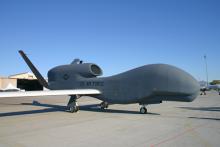
Is the U.S. scapegoating Al Qaeda? It’s an odd question, I know, but it reared its ugly head as I read about the new reports from Amnesty International and Humans Rights Watch on U.S. drone strikes. The scapegoating mechanism is a very precise instrument that accrues enormous benefits to the scapegoater. By accusing their scapegoat of wrongdoing, a scapegoater ingeniously hides from the reality of their own guilt. Now here’s the weird thing: a scapegoat does not have to be innocent to function as a scapegoat. Scapegoats can be evil, nasty, ruthless, amoral sons-of-bitches and still function perfectly well as a scapegoat. Which is why I ask the question: Is the U.S. scapegoating Al Qaeda to hide from its own guilt?
With that in mind, I invite you to read these few excerpts that raised the question for me, with key phrases in boldface:
[continued at jump]
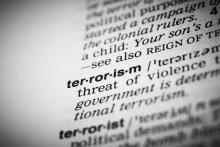
Last Saturday Muslims throughout the world celebrated Laylat ul-Qadr, usually translated in English as the Night of Power. It is part of the month of Ramadan and commemorates the night when Allah came to Muhammad with the first revelation of the Qur’an. The Night of Power is based on chapter 97 of Islam’s Holy Book. The Qur’an has 114 chapters, which are generally ordered from longest to shortest. So, chapter 97 is short enough to quote in full here:
In the name of God, the Lord of Mercy, the Giver of Mercy,
We sent it down on the Night of Power. What will explain to you what the Night of Power is? The Night of Power is better than a thousand months; on that night the angels and the Spirit descend again and again with their Lord’s permission on every task; [there is] peace that night until the break of dawn.
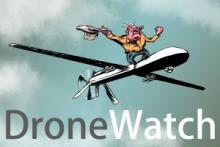
The most recent reported drone strike in Yemen, said to be five missiles fired at an SUV, killed at least six people. Reports from local tribal leaders in Yemen say that five were suspected Al Qaeda members, including a local leader. But one of those killed was a 10-year-old boy, brother of the AQ leader. Adam Baron of McClatchy News reports from Yemen:
“If an apparent U.S. drone strike this month in the village of Mahashama had killed only its intended targets – an al Qaida chief and some of his men – locals might’ve grumbled about a violation of Yemen’s national sovereignty and gone on with their lives.
“But the strike also killed a 10-year-old named Abdulaziz, the younger brother of the targeted militant, Saleh Hassan Huraydan, according to local tribal leaders and Yemenis with close ties to the al Qaida branch here. And that set off a firestorm of complaints that underscores how American airstrikes can so outrage a community that even though al Qaida loses some foot soldiers, it gains dozens of sympathizers.
“Killing al Qaida is one thing, but the death of an innocent person is a crime that we cannot accept,” said a sheikh from the area…”
Read more here.
In an effort to close down the prison at Guantanamo Bay, President Barack Obama has called to action one of Washington’s most resourceful lawyers, Clifford Sloan. President Obama and Secretary of State John Kerry are confident in their decision to employ Sloan as the State Department's envoy for Guantanamo's closure. The Huffington Post reports:
"It will not be easy, but if anyone can effectively navigate the space between agencies and branches of government, it's Cliff," Kerry said. "He's someone respected by people as ideologically different as Kenneth Starr and Justice Stevens, and that's the kind of bridge-builder we need to finish this job."
Read more here.
JEREMY SCAHILL SPENT years working out his notions of social justice in homeless shelters and conflict zones and among peace activists. In 2007, Scahill’s award-winning investigative reporting made waves when he published Blackwater: The Rise of the World's Most Powerful Mercenary Army, a comprehensive exposé on the secret role of private military contractors in the United States’ “war on terror,” which prompted several congressional inquiries. Scahill’s newest book, Dirty Wars: The World is a Battlefield, digs into the obscure underbelly of U.S. covert wars.
“In one of my trips to Yemen, I traveled in the south of the country where most of the U.S. drone strikes in Yemen have happened,” Scahill said during a recent visit to Sojourners’ Washington, D.C. office. “I was interviewing a number of tribal leaders. This guy from Shabwa province said to me, ‘[Americans] consider al Qaeda [to be] terrorism. We consider your drones [to be] terrorism.’ I heard that over and over in a variety of countries. ... Many people, in Yemen or in Somalia, would not be predisposed to think of al Qaeda as anything positive. Al Qaeda is a reviled organization in Yemen. ... But there are tribal leaders who are saying, ‘You know, you pushed us into a corner where our people are now sympathetic with al Qaeda.’ After years of traveling in these countries, I really believe that we’re creating more enemies than we’re killing.”
In some respects, drones are simply a new tool of old empire. Scahill’s book title, Dirty Wars (and film of the same name), is partly “a macabre tip-of-the-hat to the dirty wars in Central America, fueled by the United States ... targeting people who are insurgents and claiming they were communists. The new version of this is targeting people who are fighting us and claiming they’re al Qaeda.”
ON THE AFTERNOON of Dec. 14, President Obama stood in the White House press room, tears in his eyes, and spoke for many Americans who had watched the terrifying events unfolding in Newtown, Conn.
“I know there’s not a parent in America who doesn’t feel the same overwhelming grief that I do. The majority of those who died today were children: beautiful little kids between the ages of 5 and 10 years old,” he said. “They had their entire lives ahead of them—birthdays, graduations, weddings, kids of their own.”
A little more than a month later, on Jan. 23, a pilotless aircraft owned and operated by the United States and controlled remotely by an individual on U.S. soil launched a targeted attack on the riders of two motorcycles in Yemen. The attack missed its target. It hit the house of Abdu Mohammed al-Jarrah instead, killing several people—including al-Jarrah’s two children.
There was no press conference for the al-Jarrah children.
It was President Obama himself, in fact, after his inauguration in 2009, who authorized an expansion of the U.S. drone program launched under George W. Bush. The “Authorization for Use of Military Force,” passed shortly after Sept. 11, gives the president broad authority to use force against those involved in the 9/11 attacks or those who harbor them. Drones have become President Obama’s weapon of choice.
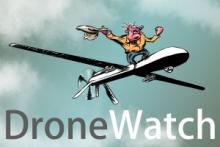
After nearly a month’s lull, two drone strikes were carried out in Yemen over the weekend, killing at least six suspected militants. Reuters reports:
Two suspected al Qaeda militants were killed on Monday in a drone strike on their vehicle south of the capital Sanaa, tribal and government sources said. The strike follows another on Saturday in which at least four militants were killed in Abyan governorate, in southernYemen.
Read more here.

The month-long break in drone strikes appears to have ended.
On Wednesday, a strike on a training camp in Pakistan killed at least five people. According to Al Jazeera:
“A US drone has fired two missiles into a Taliban training camp in Pakistan, destroying the compound and killing at least five people, local officials have said.“Wednesday's strike took place in the Baber Ghar area of the South Waziristan tribal district on the Afghan border, a stronghold of Pakistani Taliban leader Hakimullah Mehsud where the faction runs several camps.”
Also on Wednesday, two separate strikes in Yemen killed five. The Associated Press reported:
“Two U.S. drone strikes Wednesday killed at least five suspected al-Qaida militants and destroyed the house of one of them in a mountainous area south of the capital, Sanaa, a Yemeni security official and witnesses said.
“The four were killed in the first strike while riding a vehicle in the desert area of Oussab al-Ali, about 140 kilometers (90 miles) south of Sanaa, the official said. The second strike killed a fifth suspected jihadi, Hamed Radman. A drone bombed his house, the official said.”
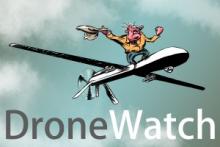
While Washington, D.C., reveled in the ceremonies and parties surrounding Inauguration Day, U.S. drones were busy in Yemen. According to Reuters, four attacks in four days, from Saturday to Tuesday, killed at least 14 people. The attacks led to a protest blockade by angry tribesmen:
“On Sunday armed tribesman, angry at what they said was a drone attack on an area inhabited by civilians, blocked the main road linking Maarib with Sanaa. Earlier this month, dozens of armed tribesmen also took to the streets in southern Yemen to protest against drone strikes that they said had killed innocent civilians and fuelled anger against the United States.”
In another protest, Reuters reported a rare criticism of drone strikes by a member of the Yemeni cabinet. Human rights minister Hooria Mashhou, who was formerly a top activist in the movement that ousted President Ali Abdullah Saleh a year ago, said during a U.N. Yemen humanitarian appeal meeting in Dubai:
"I am in favour of changing the anti-terrorism strategy. I think there are more effective strategies. We're committed to fighting terrorism but we're calling for changing the means and strategies. These means and strategies can be applied on the ground without harming civilians and without leading to human rights violations."

For a number of months, I’ve reported and commented on news of drone strikes, the drone program, and legal and political challenges to it. But with the administration’s refusal to officially acknowledge the program, there’s a a lot we don’t know. Cora Currier at Pro Publica has an informative summary of what we know and what we don’t know about drone strikes.
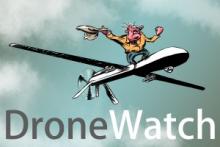
Drone strikes are being escalated in Yemen with the fifth attack in the past ten days occurring on Thursday. Reuters reports:
“At least three suspected al Qaeda militants including a local commander were killed on Thursday in Yemen by a strike from an unmanned aircraft, residents and a local official said.”
Today, in response, Yemeni tribesmen organized a protest in front of a government administration building. According to Reuters:
“Dozens of armed tribesmen took to the streets in southern Yemen on Friday to protest against drone strikes that they say have killed innocent civilians and increased anger against the United States. …
“One tribesman participating in a sit-in in front of the government administration building in Redaa told Reuters by telephone that at least seven innocent civilians were killed in the recent raids.”
Unlike Pakistan, the Yemeni government openly supports the U.S. strikes.
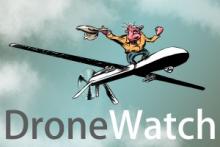
University of Notre Dame Law School Professor Mary Ellen O’Connell writes in Peace Policy of the “high-tech killing” made possible by drones, and the apparent violations of international law this creates.
“The arguments for drones continue to mutate as the technology advances to ever more powerful killing machines: Predators, Reapers, and now the Avenger. Secretary of Defense Leon Panetta announced on November 20, 2012, that the Pentagon plans to expand the use of drone attacks in Libya, Mali, and Nigeria. He said that al Qaeda has “metastasized to other parts of the global body.’’ Now the policy of targeted killing with drones is spreading to other parts of the globe.”

Reuters reports on a rare drone strike in northern Yemen, near the Saudi border.
“At least four men suspected of being al Qaeda members were killed in what a local official said was a U.S. drone strike on Islamist militants in northern Yemen on Sunday.
“It was a rare attack on al Qaeda-linked targets in northern Yemen, an area dominated by Shi'ite Muslim Houthi rebels battling Yemeni government forces for control of the rugged mountainous region.
“The official said that a drone attacked two houses in the Abu Jabara area in Saada Province, killing four people.”
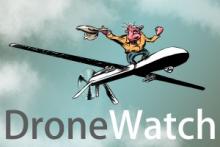
The second drone strike in four days killed four in Yemen. AFP reports
Four members of the Al-Qaeda extremist network including a local chief were killed in Yemen Sunday in a strike presumed to have been carried out by a US drone against their vehicle in Maarib province, tribal and police sources said. "A drone fired a missile at a car which had four Al-Qaeda militants in it, destroying the vehicle and killing the occupants," the tribal source said,
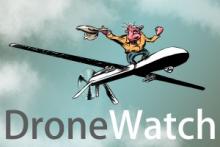
Christopher Swift, adjunct professor of national security studies at Georgetown University, traveled to Yemen this summer to interview 40 Yemeni tribal and religious leaders about the increasing U.S. drone attacks on that country. He found that the Yemeni public does not support the attacks. According to National Defense magazine, in a recent panel discussion at Georgetown, Swift said
“There is currently a shift in Yemen from drone attacks that target a particular individual to attacks that are “based upon generalize patterns of what we believe are militant characteristics and militant behavior," he said. Swift advocated a decrease in these “signature strikes,” saying they add to Yemeni concerns about civilian casualties and the United States impeding on their nation’s sovereignty.”
A report this morning by Reuters came to the same conclusion:
“Yemen's interim president has won U.S. praise for cooperating in a war on al Qaeda, but his recent public support for drone strikes that sometimes kill civilians could undermine his domestic popularity and stir sympathy for militants. ... Yemenis complain the U.S. focus on militants is a violation of sovereignty that is driving many towards al Qaeda and diverting attention from other pressing issues such as unemployment, corruption, water depletion and economic revival.”

A U.S. drone attack early Thursday morning killed nine suspected militants. Reuters reports:
"Nine suspected al Qaeda militants were killed in what a security source and residents said was a U.S. drone attack on a farmhouse outside a town in southern Yemen that was held by militants last year.
"The farmhouse just west of Jaar, one of two southern towns that Yemen's army took back from rebel control this summer, was hit by three separate missile strikes at dawn, they said.
"The residents said they found six charred bodies and the scattered remains of three other people, including Nader al-Shaddadi, a senior al Qaeda militant in the southern Abyan province who led the group that occupied Jaar."

In a speech last week at the Woodrow Wilson Center in Washington, Yemen’s president Abed Rabbo Mansour Hadiexpressed his support for U.S. drone strikes in that country. According to the New York Times,
“They pinpoint the target and have zero margin of error, if you know what target you’re aiming at,” said Mr. Hadi, a former army officer and the successor to Ali Abdullah Saleh, who stepped down after protests against his three-decade rule.
The United States “helped with their drones because the Yemeni Air Force cannot carry out missions at night,” he said. “The electronic brain’s precision is unmatched by the human brain.”
In an interview with reporters and editors from the Washington Post, Hadi said that he personally approves all drone strikes in Yemen. According to the piece:
“Every operation, before taking place, they take permission from the president,” Hadi said in an interview with reporters and editors from The Washington Post in his hotel suite in the District. …
“Hadi’s comments mark the first time he has publicly acknowledged his direct role in a campaign of strikes by U.S. drones and conventional aircraft targeting an al-Qaeda franchise that is seen as the most potent terrorist threat to the United States.”
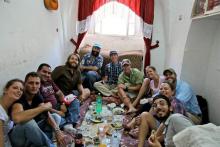
My heart is heavy.
Every day for the last week, media outlet have told their version of the current uprising stretching across the Middle East (Egypt, Libya, Yemen). Whether it’s pictures of embassies burned to the ground, rioting citizens, or highly politicized comics, the surge of content has been anything but “feel-good” and hopeful.
And that’s because the events and corresponding responses have been anything but “feel-good” and hopeful.
My heart breaks because I know the events that are unfolding do not represent the majority of those who inhabit the Middle East. I spend a significant amount of time in there and have built deep, life-long friendships.
Just two weeks ago I sat around a table and shared a meal with Christians, Jews and Muslims in the home of a devout Muslim family in the region. A day after that, I served alongside Muslim youth workers who are promoting non-violence and reconciliation in the face of oppression and poverty.
On the same day, I sat with an Arab Christian who embodied Jesus’ teaching in the Sermon on the Mount in dealing with daily injustice by saying, “We refuse to be enemies.” Lastly — and what keeps playing over and over in my head — are the words spoken to me by a Muslim friend named Omar who said,
“Please give this message to all of your American friends. We (Arab Muslims and Christians) desire peace. The violence you see in the news does not represent us. It is not the majority, it is the smallest minority of extremism. Please listen to our story and accept our friendship.”